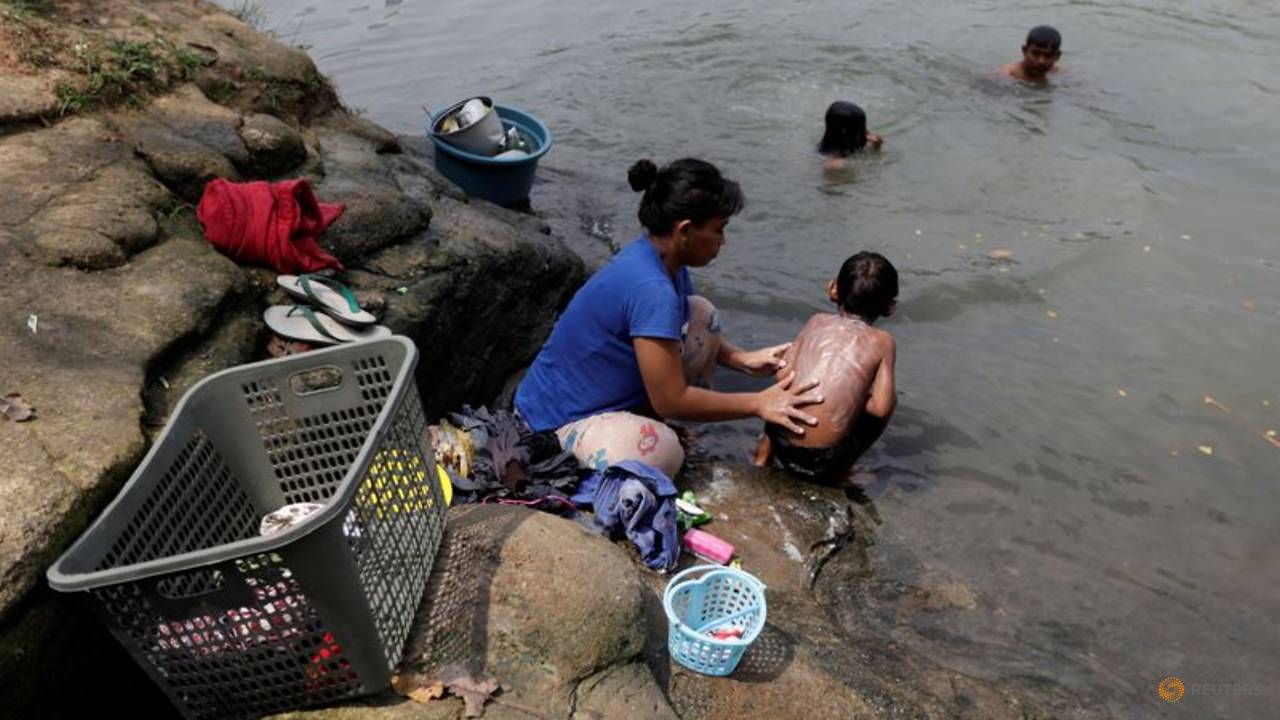TANGERANG, Indonesia: For the residents along Indonesia's Cisadane River, the coronavirus has brought not just deadly disease, but also a deluge of medical waste: A constant stream of syringes, face masks and hazmat suits floating by.
The double threat for those who depend on the 138km river to bathe and wash their clothes comes as Indonesia has struggled to contain COVID-19, now with the highest death toll in Southeast Asia, and in the past week almost 3,000 new infections a day.
Advertisement
Advertisement
As the virus has spread, medical waste had been piling up at Tangerang's Cipeucang landfill. Then in May its walls collapsed, sending tons of garbage straight into the Cisadane's khaki green waters.
READ: Mutated coronavirus strain found in Indonesia as cases jump
Eka Purwanti, a 37-year-old local, washes clothes at Cisadane river in Tangerang, Banten province, Indonesia, Aug 2, 2020. (Photo: Reuters/Willy Kurniawan)
Fishermen are seen on wooden boats as they look for fish at Cisadane river in Tangerang, Banten province, Indonesia, Aug 2, 2020. (Photo: Reuters/Willy Kurniawan)
Advertisement
Advertisement
"I still worry to be honest, but I have to wash here," local resident Eka Purwanti, 36, told Reuters, as she did her laundry in the river, and children played on the riverbank, "I hope nothing will happen, although I know it's a deadly disease."
Like countries around the world, Indonesia has seen the pandemic bring a huge increase in medical waste, an issue that has raised concern in places from Spain to Thailand and India.
In the months since the landfill collapsed, Ade Yunus, founder of the Cisadane River Rubbish Bank, has been working to cleaning up the waterway.
READ: Indonesia sees record new coronavirus cases; clusters at factories
Members of enviromental group Bank Sampah Sungai Cisadane (Banksasuci) collect medical waste at Cisadane river in Tangerang, Banten province, Indonesia, Aug 2, 2020. (Photo: Reuters/Willy Kurniawan)
"The first time we found medical waste was after the landslide," said Yunus, bending down to pick up a syringe and deposit it in a safe box. "In the beginning, we found around 50 to 60 items every day."
Indonesia's health ministry acknowledged the problem – saying 1,480 tons of COVID-19 medical waste was produced across the country from March through June – and admitted the country lacked treatment facilities, but was working on solutions.
"A new regulation has just passed that included guidelines around medical waste treatment in every health facility," said ministry official, Imran Agus Nurali.
READ: Indonesia drive-in concert delivers live music as COVID-19 rages
Medical waste collected from Cisadane river is seen inside a cardbox in Tangerang, Banten province, Indonesia, Aug 2, 2020. (Photo: Reuters/Willy Kurniawan)
An incinerator company worker wearing protective suit prepares bags of Read More – Source
TANGERANG, Indonesia: For the residents along Indonesia's Cisadane River, the coronavirus has brought not just deadly disease, but also a deluge of medical waste: A constant stream of syringes, face masks and hazmat suits floating by.
The double threat for those who depend on the 138km river to bathe and wash their clothes comes as Indonesia has struggled to contain COVID-19, now with the highest death toll in Southeast Asia, and in the past week almost 3,000 new infections a day.
Advertisement
Advertisement
As the virus has spread, medical waste had been piling up at Tangerang's Cipeucang landfill. Then in May its walls collapsed, sending tons of garbage straight into the Cisadane's khaki green waters.
READ: Mutated coronavirus strain found in Indonesia as cases jump
Eka Purwanti, a 37-year-old local, washes clothes at Cisadane river in Tangerang, Banten province, Indonesia, Aug 2, 2020. (Photo: Reuters/Willy Kurniawan)
Fishermen are seen on wooden boats as they look for fish at Cisadane river in Tangerang, Banten province, Indonesia, Aug 2, 2020. (Photo: Reuters/Willy Kurniawan)
Advertisement
Advertisement
"I still worry to be honest, but I have to wash here," local resident Eka Purwanti, 36, told Reuters, as she did her laundry in the river, and children played on the riverbank, "I hope nothing will happen, although I know it's a deadly disease."
Like countries around the world, Indonesia has seen the pandemic bring a huge increase in medical waste, an issue that has raised concern in places from Spain to Thailand and India.
In the months since the landfill collapsed, Ade Yunus, founder of the Cisadane River Rubbish Bank, has been working to cleaning up the waterway.
READ: Indonesia sees record new coronavirus cases; clusters at factories
Members of enviromental group Bank Sampah Sungai Cisadane (Banksasuci) collect medical waste at Cisadane river in Tangerang, Banten province, Indonesia, Aug 2, 2020. (Photo: Reuters/Willy Kurniawan)
"The first time we found medical waste was after the landslide," said Yunus, bending down to pick up a syringe and deposit it in a safe box. "In the beginning, we found around 50 to 60 items every day."
Indonesia's health ministry acknowledged the problem – saying 1,480 tons of COVID-19 medical waste was produced across the country from March through June – and admitted the country lacked treatment facilities, but was working on solutions.
"A new regulation has just passed that included guidelines around medical waste treatment in every health facility," said ministry official, Imran Agus Nurali.
READ: Indonesia drive-in concert delivers live music as COVID-19 rages
Medical waste collected from Cisadane river is seen inside a cardbox in Tangerang, Banten province, Indonesia, Aug 2, 2020. (Photo: Reuters/Willy Kurniawan)
An incinerator company worker wearing protective suit prepares bags of Read More – Source











